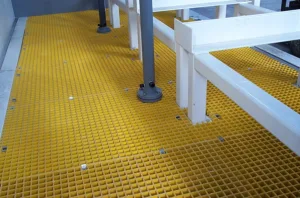Introduction
Choosing the right fiberglass floor grating supplier is crucial for ensuring the safety, durability, and overall performance of your flooring system. This guide will walk you through everything you need to know about finding the best suppliers, from understanding the types of grating available to evaluating supplier quality and negotiating contracts.

fiberglass floor grating suppliers
What is Fiberglass Floor Grating?
Fiberglass floor grating is a type of reinforced plastic grating that offers excellent strength and durability. It is made from glass fiber reinforced polymer (FRP), which provides a non-corrosive, lightweight, and robust alternative to traditional metal grating.
Types of Fiberglass Floor Grating
Molded Fiberglass Grating
Molded fiberglass grating is created by molding resin and fiberglass in a mold. It offers a high strength-to-weight ratio and excellent resistance to chemicals.
Pultruded Fiberglass Grating
Pultruded grating is made by pulling continuous fiberglass strands through a resin, forming a strong and stiff grating. It is ideal for applications requiring high load-bearing capacity.
Applications of Fiberglass Floor Grating
Fiberglass floor grating is used across various industries and applications:
- Industrial: Chemical plants, wastewater treatment facilities, and oil platforms.
- Commercial: Pedestrian walkways, parking structures, and stair treads.
- Residential: Decking, patios, and pool covers.
Benefits of Using Fiberglass Floor Grating
Durability
Fiberglass grating is known for its long lifespan and resistance to harsh environmental conditions.
Corrosion Resistance
It is impervious to chemicals and moisture, making it suitable for corrosive environments.
Safety
Fiberglass grating provides a non-slip surface, reducing the risk of accidents and enhancing workplace safety.
Key Considerations When Choosing a Supplier
Choosing the right supplier involves several key considerations to ensure you get high-quality, reliable products.
Evaluating Supplier Quality
Certifications
Look for suppliers that have relevant certifications, such as ISO certification, to ensure they meet industry standards.
Standards Compliance
Ensure the supplier complies with all relevant industry standards, such as OSHA regulations, to guarantee the safety and quality of the grating.
Experience and Expertise of Suppliers
Industry Experience
A supplier with extensive experience in the fiberglass grating industry is more likely to provide high-quality products and reliable services, such as Unicomposite.
Technical Expertise
Assess the supplier’s technical expertise, including their ability to offer custom solutions and support complex projects.
Customer Service and Support
Pre-Sales Support
Good suppliers provide comprehensive pre-sales support, helping you select the right product for your needs.
After-Sales Service
Ensure the supplier offers robust after-sales service, including installation support and maintenance advice.
Pricing and Budget Considerations
Cost vs. Value
While price is important, consider the overall value, including the durability and lifespan of the grating.
Long-Term Savings
Investing in high-quality grating can lead to long-term savings due to reduced maintenance and replacement costs.
Supplier Reputation and Reviews
Online Reviews
Check online reviews and ratings to gauge the reputation of the supplier.
Testimonials
Request testimonials from the supplier to get insights into their reliability and product quality.
Supplier Location and Availability
Local vs. International Suppliers
Consider whether a local or international supplier is more suitable for your needs, taking into account factors like lead time and shipping costs.
Customization Options
Custom Sizes
Some suppliers offer custom sizes to fit specific project requirements.
Colors and Designs
Customization options may include different colors and designs to match aesthetic preferences.
Lead Time and Delivery
Production Time
Evaluate the production time required by the supplier to ensure it aligns with your project timeline.
Shipping Options
Consider the shipping options available and the associated costs to ensure timely delivery.
Comparing Multiple Suppliers
Side-by-Side Comparison
Create a comparison chart to evaluate multiple suppliers based on key criteria like quality, cost, and service.
Pros and Cons
List the pros and cons of each supplier to make an informed decision.
Supplier Case Studies
Success Stories
Review case studies of successful projects completed by the supplier to assess their capabilities.
Industry Applications
Look at specific industry applications to understand how the supplier’s products perform in real-world scenarios.
Supplier Certifications and Standards
ISO Compliance
Ensure the supplier is ISO compliant to guarantee quality management.
OSHA Compliance
Check for OSHA compliance to ensure the products meet safety standards.
Sustainability and Environmental Considerations
Eco-Friendly Practices
Evaluate the supplier’s commitment to sustainability and eco-friendly manufacturing practices.
Material Sourcing
Consider the environmental impact of the materials used in the grating.
Innovations in Fiberglass Floor Grating
New Technologies
Stay informed about new technologies and innovations in fiberglass grating that can enhance performance and durability.
Product Improvements
Look for suppliers that continually improve their products through innovation and research.
FAQs
What is fiberglass floor grating used for? Fiberglass floor grating is used in various applications, including industrial facilities, commercial buildings, and residential areas, for its durability and non-corrosive properties.
How do I choose the right fiberglass grating supplier? Consider factors like quality, experience, customer service, pricing, and reviews when selecting a supplier.
What are the benefits of fiberglass floor grating? Benefits include durability, corrosion resistance, safety, and low maintenance.
Can fiberglass grating be customized? Yes, many suppliers offer customization options for size, color, and design to meet specific project needs.
What certifications should a good supplier have? Look for suppliers with ISO certification and compliance with industry standards like OSHA.
How important is the supplier’s location? The supplier’s location can affect lead time and shipping costs, so consider whether a local or international supplier is more suitable for your needs.
Conclusion
Choosing the right fiberglass floor grating supplier involves careful evaluation of various factors, from quality and experience to customer service and pricing. By following this guide, you can make an informed decision and find a supplier that meets your needs and ensures the success of your project.
 info@unicomposite.com
info@unicomposite.com


























